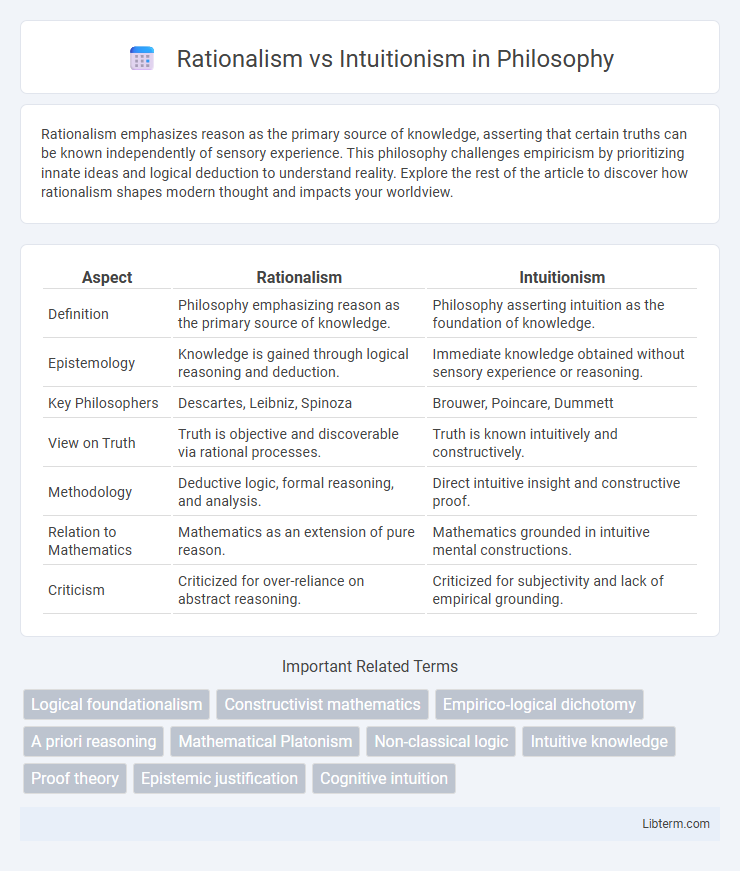Rationalism emphasizes reason as the primary source of knowledge, asserting that certain truths can be known independently of sensory experience. This philosophy challenges empiricism by prioritizing innate ideas and logical deduction to understand reality. Explore the rest of the article to discover how rationalism shapes modern thought and impacts your worldview.
Table of Comparison
| Aspect | Rationalism | Intuitionism |
|---|---|---|
| Definition | Philosophy emphasizing reason as the primary source of knowledge. | Philosophy asserting intuition as the foundation of knowledge. |
| Epistemology | Knowledge is gained through logical reasoning and deduction. | Immediate knowledge obtained without sensory experience or reasoning. |
| Key Philosophers | Descartes, Leibniz, Spinoza | Brouwer, Poincare, Dummett |
| View on Truth | Truth is objective and discoverable via rational processes. | Truth is known intuitively and constructively. |
| Methodology | Deductive logic, formal reasoning, and analysis. | Direct intuitive insight and constructive proof. |
| Relation to Mathematics | Mathematics as an extension of pure reason. | Mathematics grounded in intuitive mental constructions. |
| Criticism | Criticized for over-reliance on abstract reasoning. | Criticized for subjectivity and lack of empirical grounding. |
Understanding Rationalism: Key Principles
Rationalism emphasizes reason as the primary source of knowledge, asserting that truths can be discovered through logical deduction and innate ideas rather than sensory experience. Key principles include the belief in a priori knowledge, the reliability of intellectual intuition, and the structured use of rational reflection to uncover universal truths. Prominent rationalist philosophers like Descartes, Spinoza, and Leibniz contribute foundational concepts such as clear and distinct ideas, logical necessity, and the mind's active role in shaping knowledge.
Unpacking Intuitionism: Foundational Concepts
Intuitionism, a foundational theory in the philosophy of mathematics, asserts that mathematical truths are known through direct mental intuition rather than empirical evidence or formal logic. Central to this concept is the belief that numbers are constructive mental entities, and proofs must be explicitly constructed rather than inferred by contradiction. Intuitionism rejects the law of excluded middle, emphasizing constructive methods that produce verifiable evidence within the scope of human cognitive capabilities.
Historical Roots of Rationalism and Intuitionism
Rationalism, rooted in the works of Descartes, Spinoza, and Leibniz during the 17th century Enlightenment, emphasizes reason as the primary source of knowledge, asserting that certain ideas are innate and can be accessed through deductive logic. Intuitionism, emerging in the early 20th century with philosophers like L.E.J. Brouwer, centers on the concept that mathematical truths are known through direct, mental intuition rather than empirical evidence or purely rational deduction. These contrasting origins highlight rationalism's foundation in classical philosophy and intuitionism's development as a response to formalism and logicism within the philosophy of mathematics.
Major Philosophers: Rationalists vs Intuitionists
Rene Descartes, Baruch Spinoza, and Gottfried Wilhelm Leibniz are major rationalist philosophers who emphasize reason as the primary source of knowledge, advocating for innate ideas and deductive reasoning. In contrast, intuitionism, notably advanced by Henri Bergson and L.E.J. Brouwer, stresses immediate, non-discursive insight as foundational for understanding truth, particularly in ethics and mathematics. Rationalists prioritize structured logical frameworks, while intuitionists highlight the role of personal, intuitive experience in grasping fundamental truths.
Epistemological Differences: Reason vs Intuition
Rationalism emphasizes reason as the primary source of knowledge, asserting that truths can be deduced through logical analysis and innate ideas without reliance on sensory experience. Intuitionism, in contrast, holds that knowledge originates from immediate intuitive insight, especially in mathematics and ethics, where certain truths are self-evident and require no inferential justification. The epistemological divide centers on whether knowledge is grounded in deductive reasoning processes or in non-inferential, instinctive understanding.
Rationalism in Modern Thought
Rationalism in modern thought emphasizes reason as the primary source of knowledge, asserting that certain truths are innate and can be discovered through logical deduction without empirical evidence. Key figures like Descartes, Spinoza, and Leibniz advocate for a systematic, mathematical approach to understanding reality that prioritizes abstract principles over sensory experience. Rationalism underpins developments in analytic philosophy, cognitive science, and artificial intelligence by promoting formal reasoning and the coherence of innate ideas in epistemology.
Intuitionism’s Impact on Contemporary Philosophy
Intuitionism significantly shapes contemporary philosophy by emphasizing knowledge derived from innate insights rather than empirical evidence, influencing debates in epistemology and ethics. Its impact is evident in the development of non-classical logic systems and moral realism that prioritize self-evident truths and direct cognitive grasp of principles. Contemporary philosophers integrate intuitionism to challenge purely rationalist frameworks, promoting a nuanced understanding of human cognition and moral judgment.
Applications in Ethics and Mathematics
Rationalism in ethics prioritizes logical reasoning and universal principles to determine moral truths, often applied in deontological theories where consistent rules guide decision-making. In mathematics, rationalism supports the use of deductive proofs and innate concepts, exemplified by formalism and logicism, which rely on reason rather than empirical evidence. Intuitionism, contrastingly, emphasizes constructive methods and mental constructions in mathematics, rejecting non-constructive proofs, while in ethics it underscores the role of immediate moral insight and personal conscience over abstract rules.
Key Critiques and Counterarguments
Rationalism faces critiques for overemphasizing reason and neglecting the role of sensory experience and emotional insight in knowledge formation. Intuitionism is challenged for its reliance on subjective, often non-verifiable insights, which critics argue lacks rigorous justification. Defenders of rationalism highlight its structured methodology and logical consistency, while intuitionists emphasize the immediacy and foundational nature of intuitive knowledge as irreducible to purely rational analysis.
Bridging Rationalism and Intuitionism: Toward Synthesis
Bridging rationalism and intuitionism involves integrating reason's structured logic with intuition's immediate knowledge to form a cohesive epistemological framework. This synthesis emphasizes how rational deduction complements intuitive insights, enabling deeper understanding in mathematics and philosophy. Combining these approaches fosters robust problem-solving processes that leverage both analytic rigor and spontaneous cognition.
Rationalism Infographic

 libterm.com
libterm.com